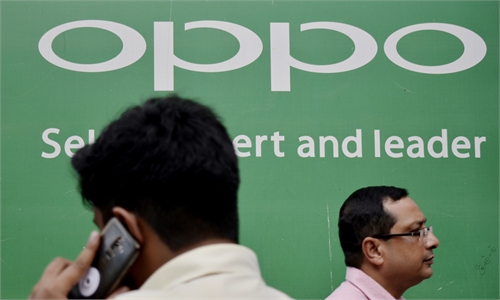
Illustration: Liu Xiangya/GT
Apple Inc's annual sales in India jumped 33 percent to a record of almost $8 billion in the year through March, underscoring a rapidly growing market where the iPhone maker now assembles more of its devices, Bloomberg reported on Monday, citing a person familiar with the matter.If Bloomberg's report is accurate, the trend it suggests is roughly in line with expectations. Apple has tried to expand its footprint in the Indian market.
In April 2023, the iPhone maker launched the company's first retail store in Mumbai, India. It is not surprising that sales in India rose in the first year after the launch of its first retail store.
Regardless of whether or not Apple can maintain its high-speed growth in sales as new-store effects gradually fade, Indians may hope the surge in sales can serve as a new catalyst for the iPhone maker to further invest into the country's smartphone supply chains.
In April, Bloomberg reported that Apple assembled $14 billion worth of iPhones in India last fiscal year. This is good news for India's manufacturing industries and economy. However, Apple is facing challenges as it tries to further increase production in India.
For instance, at a casings factory in southern India run by conglomerate Tata Group, just about half of the components coming off the production line were in good enough shape to be sent to Apple's supplier Foxconn, the Financial Times reported in February 2023, citing a person familiar with the matter.
Two people who have worked in Apple's offshore operations were quoted as saying that the factory is on a plan toward improving the proficiency of workers but the road ahead is long.
To make matters worse, as India doubles down on local manufacturing, the country's high tariffs as well as its protectionist measures increase production costs, underlining a growing sentiment of economic nationalism and protectionism.
Chinese companies are important participants in India's smartphone sector. Chinese smartphone brands saw their cumulative market share rise to 75 percent in the March quarter, despite government scrutiny, according to the Economic Times.
In the past few years, Chinese smartphone manufacturers have been unfairly treated in India. Some observers attribute this partly to Chinese brands' unexpected economic success in the Indian market. To some extent, India's attitude toward Chinese smartphone companies can be a touchstone of whether India is willing to share its market dividends with multinational corporations.
India's treatment of some foreign companies has been in serious violation of market principles and rules, and the country has long been criticized by some analysts as a "graveyard for foreign investment."
Indian officials are trying hard to attract foreign investment. However, if India cannot improve its business environment and provide fair treatment to multinational corporations, including Chinese companies, it will face difficulties and challenges in converting its market dividends into manufacturing investments.
Statistics from International Data Corp show India's smartphone market shipped 34 million smartphones in the first quarter of 2024, with 11.5 percent growth year-on-year, making it the third consecutive quarter of growth in shipments.
The Indian smartphone market has shown robust growth. However, this does not necessarily mean India can make its growing consumer market a catalyst to speed up the development of its manufacturing sectors.
We hope that India can improve its business environment and treat all foreign investors in a fair, transparent and non-discriminatory manner. It is the only way India can maximize its economic interests and make itself an attractive investment destination for global manufacturers, including but not limited to Apple.
The author is a reporter with the Global Times. bizopinion@globaltimes.com.cn



